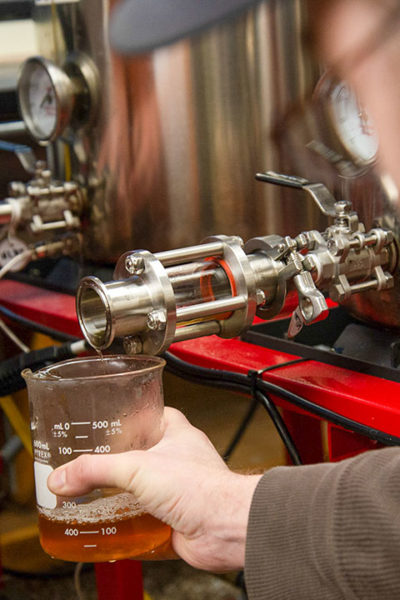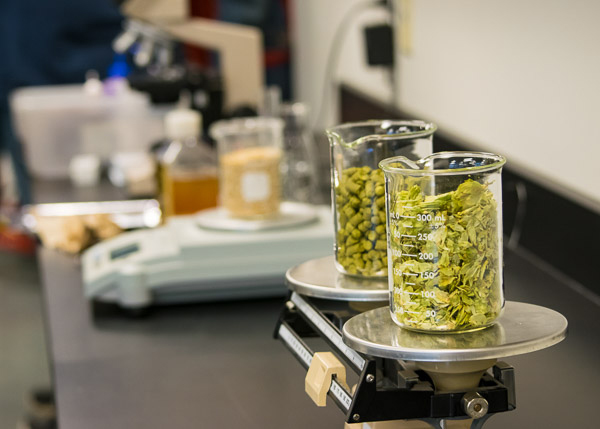Brewers are always tinkering, crafting new and better beers, and the same can be said for the innovative brewing education at Pennsylvania College of Technology.
Starting in Fall 2021, the college’s brewing and fermentation science major is evolving from a two-year associate degree into a one-year certificate, narrowing the time it’ll take for students to move through the program, but maintaining the rigor and quality of the training. The certificate is designed for adults 21 and older who wish to work in the dynamic commercial brewing industry; ideal for either returning-to-education or recently graduated individuals.
Applications are now being accepted.
 “The certificate program immerses students in our brewing curriculum, but removes the general education coursework associated with the two-year degree,” said Sue A. Kelley, dean of business, arts and sciences. “This streamlined approach provides an opportunity for individuals to develop skills and knowledge related to the brewing industry in a more expedited timeframe.”
“The certificate program immerses students in our brewing curriculum, but removes the general education coursework associated with the two-year degree,” said Sue A. Kelley, dean of business, arts and sciences. “This streamlined approach provides an opportunity for individuals to develop skills and knowledge related to the brewing industry in a more expedited timeframe.”
Penn College initiated its brewing program in Fall 2017 with the guidance and collaboration of industry experts, science faculty and brewmaster Timothy L. Yarrington, who joined the college faculty to serve as the program’s instructor.
“I want to contribute to the sustainable, healthy growth of the brewing industry by handing down to my students the technical and scientific knowledge behind brewing, while building an appreciation for the important impact the brewing industry can have on the economy and communities,” Yarrington said.
With 25 years of experience in the brewing industry, Yarrington’s career highlights include winning multiple medals at the renowned Great American Beer Festival in Denver, building a brewery in Times Square, and serving as head brewmaster at Elk Creek Café & Aleworks in Millheim.
He graduated from the Master Brewers Program at the American School for Malting and Brewing Science and Technology, University of California, Davis; passed the Institute of Brewing and Distilling Associate Membership Examination; and knows the importance of obtaining a formal brewing education.
“While a formal brewing education gives applicants a definite advantage when competing for the best jobs in the industry, more importantly, it empowers our graduates to control their career trajectory,” Yarrington said. “Individuals who have a comprehensive understanding of the science, technology, metrics and protocols involved in brewing acquire greater responsibility more rapidly in almost every commercial brewing organization. Although there is no substitute for professional experience, entering the industry with our certificate means that our graduates can have more choice in where they work, who they work for, and to what level of responsibility they might ascend.”
Among entry-level positions available to individuals with a formal brewing education are: brew house operator, cellaring technician, packaging technician and lab assistant at larger breweries; assistant brewer at mid-sized breweries; and lead brewer at smaller breweries.
Yarrington says Penn College’s location is ideally situated in the center of a state with a celebrated brewing history and a vibrant community of engaged brewers – further boosting students’ educational opportunities and graduates’ employment options.
 “Pennsylvania produces more beer than any other state in America,” Yarrington said. “Williamsport is located at the geographic center of the state and is surrounded by an ever-increasing number of craft breweries. We have a lot of nearby resources that provide our students opportunities to engage with the industry directly.”
“Pennsylvania produces more beer than any other state in America,” Yarrington said. “Williamsport is located at the geographic center of the state and is surrounded by an ever-increasing number of craft breweries. We have a lot of nearby resources that provide our students opportunities to engage with the industry directly.”
Penn College’s brewing and fermentation science program taps into the math, science, technology, business and art of brewing – a comprehensive overview of the essentials needed to build a career in the industry.
“You have to be a scientist, physicist and artist to be a brewer,” Yarrington added. “Students learn not just the science and metrics of beer, they gain an understanding of the entire physical process, the challenges of designing an efficiently functioning brewery, as well as the communication and organizational skills needed to succeed.”
With 100% job placement among graduates from the associate degree program, students with a Penn College certificate in brewing and fermentation science can expect to be well-received by the brewing industry.
To learn more about Penn College’s brewing and fermentation science certificate, visit or call the School of Business, Arts & Sciences at 570-327-4521.
For more about the college, a national leader in applied technology education, email the Admissions Office or call toll-free at 800-367-9222.
Starting in Fall 2021, the college’s brewing and fermentation science major is evolving from a two-year associate degree into a one-year certificate, narrowing the time it’ll take for students to move through the program, but maintaining the rigor and quality of the training. The certificate is designed for adults 21 and older who wish to work in the dynamic commercial brewing industry; ideal for either returning-to-education or recently graduated individuals.
Applications are now being accepted.
 “The certificate program immerses students in our brewing curriculum, but removes the general education coursework associated with the two-year degree,” said Sue A. Kelley, dean of business, arts and sciences. “This streamlined approach provides an opportunity for individuals to develop skills and knowledge related to the brewing industry in a more expedited timeframe.”
“The certificate program immerses students in our brewing curriculum, but removes the general education coursework associated with the two-year degree,” said Sue A. Kelley, dean of business, arts and sciences. “This streamlined approach provides an opportunity for individuals to develop skills and knowledge related to the brewing industry in a more expedited timeframe.”Penn College initiated its brewing program in Fall 2017 with the guidance and collaboration of industry experts, science faculty and brewmaster Timothy L. Yarrington, who joined the college faculty to serve as the program’s instructor.
“I want to contribute to the sustainable, healthy growth of the brewing industry by handing down to my students the technical and scientific knowledge behind brewing, while building an appreciation for the important impact the brewing industry can have on the economy and communities,” Yarrington said.
With 25 years of experience in the brewing industry, Yarrington’s career highlights include winning multiple medals at the renowned Great American Beer Festival in Denver, building a brewery in Times Square, and serving as head brewmaster at Elk Creek Café & Aleworks in Millheim.
He graduated from the Master Brewers Program at the American School for Malting and Brewing Science and Technology, University of California, Davis; passed the Institute of Brewing and Distilling Associate Membership Examination; and knows the importance of obtaining a formal brewing education.
“While a formal brewing education gives applicants a definite advantage when competing for the best jobs in the industry, more importantly, it empowers our graduates to control their career trajectory,” Yarrington said. “Individuals who have a comprehensive understanding of the science, technology, metrics and protocols involved in brewing acquire greater responsibility more rapidly in almost every commercial brewing organization. Although there is no substitute for professional experience, entering the industry with our certificate means that our graduates can have more choice in where they work, who they work for, and to what level of responsibility they might ascend.”
Among entry-level positions available to individuals with a formal brewing education are: brew house operator, cellaring technician, packaging technician and lab assistant at larger breweries; assistant brewer at mid-sized breweries; and lead brewer at smaller breweries.
Yarrington says Penn College’s location is ideally situated in the center of a state with a celebrated brewing history and a vibrant community of engaged brewers – further boosting students’ educational opportunities and graduates’ employment options.
 “Pennsylvania produces more beer than any other state in America,” Yarrington said. “Williamsport is located at the geographic center of the state and is surrounded by an ever-increasing number of craft breweries. We have a lot of nearby resources that provide our students opportunities to engage with the industry directly.”
“Pennsylvania produces more beer than any other state in America,” Yarrington said. “Williamsport is located at the geographic center of the state and is surrounded by an ever-increasing number of craft breweries. We have a lot of nearby resources that provide our students opportunities to engage with the industry directly.”Penn College’s brewing and fermentation science program taps into the math, science, technology, business and art of brewing – a comprehensive overview of the essentials needed to build a career in the industry.
“You have to be a scientist, physicist and artist to be a brewer,” Yarrington added. “Students learn not just the science and metrics of beer, they gain an understanding of the entire physical process, the challenges of designing an efficiently functioning brewery, as well as the communication and organizational skills needed to succeed.”
With 100% job placement among graduates from the associate degree program, students with a Penn College certificate in brewing and fermentation science can expect to be well-received by the brewing industry.
To learn more about Penn College’s brewing and fermentation science certificate, visit or call the School of Business, Arts & Sciences at 570-327-4521.
For more about the college, a national leader in applied technology education, email the Admissions Office or call toll-free at 800-367-9222.